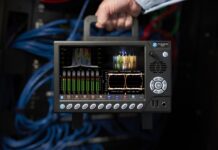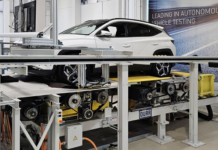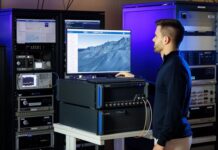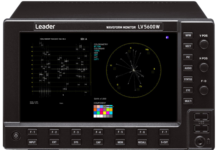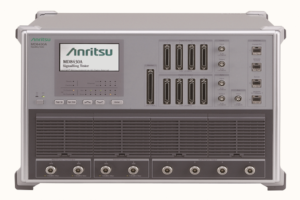
Anritsu Corporation (President Mr Hirokazu Hamada) announces the March 26 release of the following two software options extending the functions of the company’s Signalling Tester MD8430A to measure the faster LTE-Advanced Pro (LTE-A Pro) communications speeds.
- LTE DL 6 Carrier Aggregation Option MD8430A-044
- LTE UL 256QAM Option MD8430A-079
The Signalling Tester MD8430A is an LTE-A Pro base station simulator for configuring a benchtop pseudo-network required to develop chipsets and data terminals. Adding these software options to extend the MD8430A functions supports world-first data throughput tests at up to 2 Gbps (DL) and up to 300 Mbps (UL) by using DL 6CA and UL 256 QAM at connections with LTE-A Pro terminals.
This release as well as other Anritsu plans to extend the MD8430A functions will help earlier worldwide deployment of LTE-A Pro mobile services.
Development Background
As well as supporting Carrier Aggregation (CA) for extending the communications bandwidth, the LTE-A Pro standard uses MIMO antenna technology to achieve communication speeds ranging from 1 to 3 Gbps while moving. Prior to full-scale deployment of 5G communications supporting multi-gigabit speeds, LTE-A Pro aims for a smooth transition from the current LTE technology to 5G with the following key tests for the mobile communications market.
- Tests in environments with more component carriers (CCs) supporting higher throughputs
- Protocol tests using antenna channel modeling required to evaluate LTE-A Pro terminal performance in actual usage environments
Anritsu has targeted these tests by releasing the above two new options to extend the functions of its MD8430A.
Product Outline
The Signalling Tester MD8430A is a base station simulator for LTE-A Pro networks. It supports LTE-A Pro terminal tests by offering a pseudo-network environment with speeds of 2 Gbps (DL) and 300 Mbps (UL) at DL 6CA and UL 256 QAM, respectively, using the released functions.
In addition, it can output multiple base station signals in the same band from one Tx antenna, helping cut the required MD8430A units even when the number of Tx signals is increased by more CCs.
Moreover, combined use with the Rapid Test Designer (RTD) GUI-based test sequence creation tool makes it easy to both create test cases needed to simulate base stations in MIMO environments, as well as to efficiently configure various test environments, such as locations with poor reproducibility when using actual base stations.
Target Markets and Applications
Target Markets: Chipset makers, terminal makers, mobile operators, etc.
Applications: Evaluation of LTE-Advanced Pro chipsets, smartphones, and accessory equipment.




